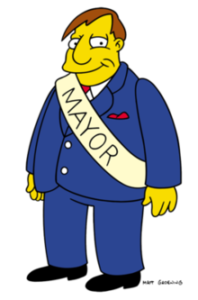
Mayor Quimby is NOT the best example.
There was a fascinating profile last week in the New York Times’ Sunday Magazine about Mayor Pete of South Bend, Indiana.
Pete Buttigieg, 37, is running for president and as of today is considered a “top-tier” Democratic contender in a large field of candidates.
I’m drawn to the Mayor Pete story for several reasons but mostly because he’s a mayor, having been elected to the top office in Indiana’s fourth largest city while still in his 20s.
I can relate –somewhat– to the story having also been a mayor albeit in my late 30s of a city that toggled between the third and fourth largest in Palm Beach County at the time.
That’s kind of where the similarities end.
Mayor Pete went to Harvard and was a Rhodes Scholar who speaks 8 languages. I went to SUNY Oswego (the Harvard of Central New York) took Spanish in junior high school and studied Hebrew for my Bar Mitzvah but never really could master either language.
But we do have something else in common.
Mayor Pete, while running for president, is trying to heal a city in the wake of a police shooting of an African American resident. I had a similar experience in 2005.
What I don’t understand is how you can do two jobs at once—run for president and serve effectively as a mayor.
Perhaps you might be able to slide by if you’re in Congress if you miss a few votes, but serving as a mayor is the political equivalent of a hands-on, 24-7 job.
As someone is quoted in the Times story—when you are a mayor “every turd tends to land on your doorstep and everyone knows where your doorstep is”.
Not the most elegant description but apt nonetheless.
And it doesn’t matter if you a so-called “strong mayor” like Mayor Pete or if you serve in a council-manager form of government like we have in Delray Beach and Boca Raton.
The buck stops with you on everything that happens in your city. Some of it you can exert some measure of control over—zoning, budgets, capital projects—but some you just can’t control—such as shootings, natural disasters or when the principal of your local high school decides to question the validity of The Holocaust. In Florida, schools are the purview of the School Board, but you can be assured that my friend Boca Mayor Scott Singer was deeply involved in that recent controversy as he should have been.
When a shooting occurs in a city the mayor needs to be present.
The NYT story quotes Buttigieg as saying that mayors serve as their community’s pastors and commanders in chief—an interesting and accurate description.
When tragedy strikes and anger, sadness and emotions swell, mayors are there to absorb the pain.
It’s hard to do that when you are campaigning in Iowa or pressing the flesh at a fish fry in New Hampshire.
That said, I’m not of the school that mayors can’t be good presidents, even though none have ever made the leap directly from City Hall to 1600 Pennsylvania Avenue.
In fact, mayors may be uniquely qualified to serve in this moment of division and gridlock. After all, when you are mayor you are compelled to solve problems, tend to look for non-partisan solutions and are always reminded that policies at their core effect real people, something that every elected official ought to remember.
Mayors serve in a fish bowl, everybody sees you. There’s no hiding behind a party and no voting in distant places like Washington orTallahassee.
That proximity keeps the best mayors grounded in reality—they have to live close to the impacts both positive and negative– of their decisions.
I like that—it leads to accountability but only if your constituency is paying attention as we should always do.
So yes, I think mayors could be good presidents. But I don’t think they can or should run at the same time they are serving their cities.
We’d all be better off if the people we elect concentrate on the jobs we elected them to do. That goes for the Mayor of NYC as well, who was out of town when his city suffered a large blackout earlier this month.
Yes, you can fly back as Mayor DeBlasio and Mayor Pete did when crises occurred. But then they have to fly out again—which leaves their cities rudderless.
That’s never a good thing.
